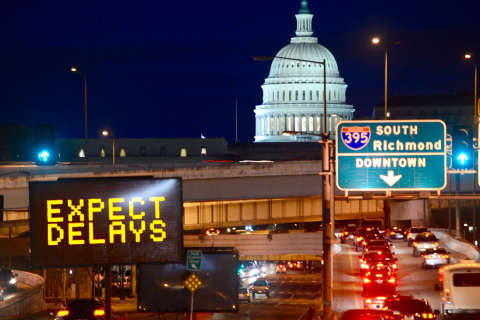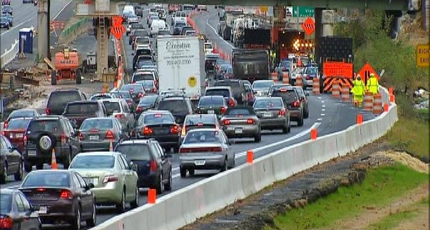WASHINGTON — What’s more frustrating: your drive to work in the morning or the trip back home in the evening?
It turns out drivers in D.C. are more likely to encounter traffic-clogged streets and longer-than-normal trips during the evening rush-hour commute, according to a new study on traffic congestion released by the District Department of Transportation on Monday.
The percentage of D.C. roadways where congestion significantly slows traffic is five times higher during the evening commute than during the morning commute, according to the “District Mobility Project,” which includes an interactive website tracking traffic congestion and other commuting trends.
To measure congestion, study authors used a metric called the “travel time index,” which compares how long it takes drivers to navigate roads during “peak” travel times versus how long it takes them to make the same trip during light or “free-flowing” traffic conditions.
An index of 2.0, for example, means a trip that would normally take 20 minutes under light conditions actually takes twice as long during peak times or 40 minutes.
During the peak evening commute, which the study defines as between 3 p.m. and 6:59 p.m., 15 percent of D.C. roadways have a congestion index higher than 2.0.
During the morning commute, defined as 6 a.m. to 8:59 a.m., only 3 percent of roads have a similarly high congestion index.
The evening commute is not only more congested but less reliable, said Stephanie Dock, DDOT’s research program administrator, in an interview with WTOP.
“In the typical 9-to-5 type job, [commuters are] getting in at a more consistent time,” Stephanie Dock, DDOT’s research program administrator, told WTOP. “In the evening, however, you tend to have a different range of activities going on. Some folks just leave and go straight home and they do the same work every day. But a lot of people might go out with some co-workers after work,” or run errands.
Dock added, “And what that means is just the patterns of how people move are not as consistent day-to-day, which contributes to the lower reliability of the system.”
The D.C. roadway with the highest congestion index is the Key Bridge heading into D.C. with an index of 3.66. That means it takes drivers more than three and a half times as long to traverse during the evening rush compared to other times. Traffic slows to only 8 mph on the bridge during that time, compared to 26 mph under light traffic condition, the study said.
At other times of day, the Southeast Freeway has the highest congestion index. During the morning rush, it takes drivers three times as long to travel the westbound side of the Southeast Freeway. And during the midday, when traffic on other streets tends to clear, congestion on the Southeast Freeway actually worsens slightly.
Heavy commuter routes, such as Chain Bridge and New York Avenue, also experience heavy congestion, according to the study.
The congestion index is compiled from real-time traffic data provided by a company called INRIX. The company’s software is built into many cars’ navigation systems and is on smartphone apps. An estimated 500,000 commuters and visitors travel to and from the District each day, according to the study.
Still, travel-time is not a perfect measure of congestion, study authors said, especially when it comes to roadways in downtown D.C., because the proliferation of traffic lights there can slow traffic even during “free-flowing” conditions.
The data on traffic congestion is just one facet of D.C.-area travel researchers are studying. In addition to the study published Monday, DDOT launched a data-driven interactive website to track the performance of the region’s transportation system.








